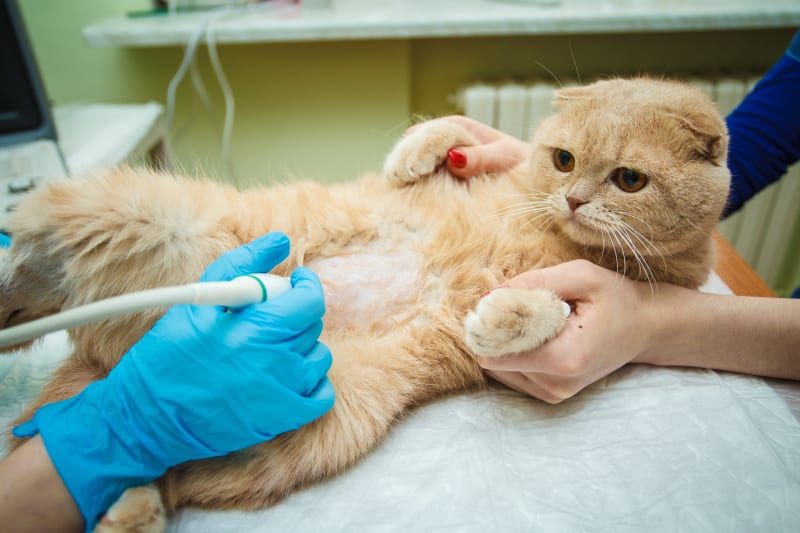What is an ultrasound?
Experienced pet owners know that despite their best efforts, their curious four-legged friends may wander into things they shouldn’t, or develop tumors or conditions that need treatment. Ultrasounds transmit sound waves into your pet’s body, producing an image of specific internal structures.
Your vet can also use this safe, non-invasive technology to diagnose pericardial effusion and hemoabdomen (blood around the heart and in the abdomen).
Why does my pet need an ultrasound?
With an ultrasound, your vet can view the architecture of your pet’s organs so objects can be identified and found.
At Thomasville Veterinary Hospital Urgent Care + Surgery, our veterinarians use ultrasounds and other diagnostic tools to provide an accurate diagnosis of your pet’s medical issues, so effective treatment can be administered.
This tool allows us to tell soft tissue masses, fluid and foreign bodies apart - a task that may prove challenging to achieve with a digital x-ray. The sound waves the ultrasound generates will not be harmful or painful for your cat or dog.
Here are a few examples of conditions that may require an ultrasound to detect:
Heart Conditions
If your dog or cat has a heart condition, your vet may recommend an echocardiogram to help find out whether your pet will require heart medication.
Examination of Soft Tissues
An ultrasound can be used to examine almost all of the body’s soft tissues to evaluate:
- Fetal viability and development
- Thyroid glands
- Tendons
- Ligaments
- Eyes
If abnormal tissue is discovered during the ultrasound, a vet may be able to collect tissue samples.
How are samples collected?
These methods are typically used to collect samples:
- Tri-Cut biopsies
- Ultrasound-guided fine needle aspiration
Your dog may need to be sedated with these methods. Biopsies can be performed with ultrasound imaging, in a less invasive manner than surgery would entail.
Abnormal Blood or Urine Test Results
If abnormalities are discovered in your dog’s blood or urine tests, an abdominal ultrasound may be recommended.
This can help our veterinary team see internal organs such as lymph nodes, spleen, kidneys, urinary bladder, liver or other areas to find out what’s causing the specific abnormalities.
Types of Ultrasounds
Your met may perform either of these two types of ultrasounds:
Emergency Ultrasounds
In emergency situations, ultrasounds are typically focused on the chest and abdomen to quickly look for pneumothorax (a condition in which gas or air collects in the area surrounding the lungs) or serious internal hemorrhaging (bleeding).
Emergency ultrasounds can help us identify and diagnose the problem quickly, then plan effective treatment.
Echocardiograms
Also known as cardiac ultrasounds, echocardiograms help us closely examine the heart and the structures around it, including the pericardial sac, to determine whether the heart is functioning correctly. If your pet’s heart is malfunctioning, it can also help reveal the issue.
Typically painless, these detailed ultrasounds need numerous measurements and calculations. Your vet may recommend one if your pet was recently diagnosed with a heart murmur or is displaying signs of heart disease.
How should I prepare for a veterinary ultrasound?
Ask your vet how you should prepare for the ultrasound. Leading up to your pet’s ultrasound appointment, you may need to withhold water and food for 8 to 12 hours, specifically for abdominal ultrasounds.
The area to be examined by your vet will be shaved, so clear images can be captured. While most pets won’t have trouble holding still during the ultrasound, some will need to be sedated.
Note: The advice provided in this post is intended for informational purposes and does not constitute medical advice regarding pets. For an accurate diagnosis of your pet's condition, please make an appointment with your vet.
Do you have questions about your upcoming ultrasound at Thomasville Veterinary Hospital Urgent Care + Surgery? Our Thomasville vets are here to diagnose and treat your pet, and effectively address your concerns. If your pet has been diagnosed with a serious medical condition and requires specialty veterinary care, contact us today to book a consultation.
Looking for a vet in the Thomasville area?
We're always accepting new patients, so contact our veterinary hospital today to book your pet's first appointment.
Related Articles View All
Parvovirus - Dog Symptoms, Spread, Vaccine & Treatment
What are the symptoms of parvovirus in dogs? What makes puppies so susceptible to the disease? How can you protect your dog against parvovirus? Find the answers to these questions and more in today's blog post.
Grooming Anxiety in Dogs & What To Do
Does your dog become anxious and scared when it comes to grooming time? Here are a few tips to help make grooming easier for you and your canine companion.
Can dog's get cavities?
Dental health is a key aspect of overall health for our canine family members, but many pet parents know very little about dog dental health. Can dogs get cavities? What are the signs of cavities in dogs? Read on to find out.
Signs of Infection After Neutering Your Dog
Infection is rare following a dog spay and neuter procedure, nevertheless, they can happen. Here, you will find information on what to expect from spaying or neutering your dog and the signs of infection to watch for.
Laser Spay or Traditional Spay: Which is Better?
It's time to get your pet spayed, but should you opt for laser spay or traditional spay? Today, we look at the differences between laser spay and traditional spay techniques, and the benefits of getting your dog or cat spayed.

